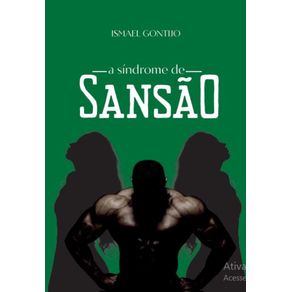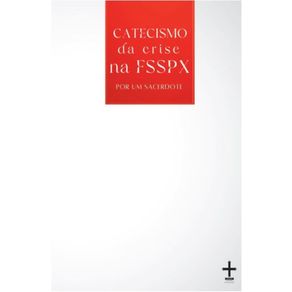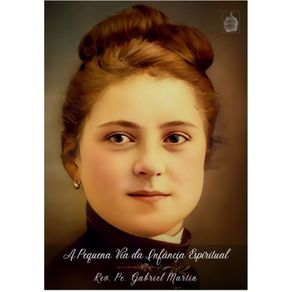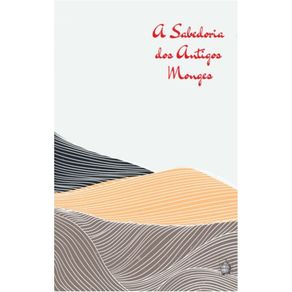| Selo | Evertype |
|---|---|
| Edição | 0 |
| Idioma | Inglês médio |
| Autores | Não informado |
| Acabamento | Capa Dura |
| Quantidade de Páginas | 776 |
| Origem | Literatura Estrangeira |
 Fogo Ardente: A Vida de São Pio X
Fogo Ardente: A Vida de São Pio X
Editora Triregnum
R$ 94,90 à vista Sonhos esquecidos em Lodebar - Deus ainda restaura sonhos
Sonhos esquecidos em Lodebar - Deus ainda restaura sonhos
Ases da Literatura
R$ 49,90 à vista A Sindrome De Sansão
A Sindrome De Sansão
Editora Seeds
R$ 46,90 à vista Terapia Vibracional e Espiritualidade no Livro dos Salmos
Terapia Vibracional e Espiritualidade no Livro dos Salmos
Becalete
R$ 59,90 à vista O Desenrolar Do Rolo - Panorama Ministerial
O Desenrolar Do Rolo - Panorama Ministerial
Editora Lexia
R$ 49,90 à vista Manual do Devoto de Santa Teresinha
Manual do Devoto de Santa Teresinha
Editora Triregnum
R$ 87,90 à vista Idolatria na Igreja Evangélica
Idolatria na Igreja Evangélica
AZ7 Editora
R$ 29,90 à vista Inclusão à Luz da Bíblia
Inclusão à Luz da Bíblia
Becalete
R$ 33,90 à vista A Maçonaria e os Jesuítas
A Maçonaria e os Jesuítas
Editora Triregnum
R$ 69,90 à vista Catecismo da Crise na FSSPX
Catecismo da Crise na FSSPX
Edições do Mosteiro da Santa Cruz
R$ 33,90 à vista Poder da fé - Orações que tocam a alma
Poder da fé - Orações que tocam a alma
Ás Editorial
R$ 39,90 à vista Lá em casa uma contemplação da família perfeita: #só que não
Lá em casa uma contemplação da família perfeita: #só que não
Becalete
R$ 56,90 à vista Igreja Cristã Primitiva x Igreja Contemporânea
Igreja Cristã Primitiva x Igreja Contemporânea
Becalete
R$ 50,00 à vista Comentário ao livro do Deuteronômio - Busca da terra, moradia e sociedade sem empobrecidos e excluídos
Comentário ao livro do Deuteronômio - Busca da terra, moradia e sociedade sem empobrecidos e excluídos
Dialética
R$ 99,65 à vista Pecado, Expiação e Salvação como Processo - Três doutrinas bíblicas, três temas bíblicos que, postos e estudados em seq
Pecado, Expiação e Salvação como Processo - Três doutrinas bíblicas, três temas bíblicos que, postos e estudados em seq
Dialética
R$ 57,65 à vista Fogo Ardente: A Vida de São Pio X
Fogo Ardente: A Vida de São Pio X
Editora Triregnum
R$ 94,90 à vista 70 x 7: O perdão é uma das linguagens do amor de Deus
70 x 7: O perdão é uma das linguagens do amor de Deus
SGuerra Design
R$ 34,90 à vista Aprendei De Mim, Que Sou Manso E Humilde De Coração
Aprendei De Mim, Que Sou Manso E Humilde De Coração
Um Livro
R$ 59,90 à vista Feridas que te marcam, dores que te param
Feridas que te marcam, dores que te param
Ases da Literatura
R$ 49,90 à vista A pastora e o leão - Da Ferida de Eva ao Fruto do Espírito
A pastora e o leão - Da Ferida de Eva ao Fruto do Espírito
Ases da Literatura
R$ 54,90 à vista Uma mulher feliz
Uma mulher feliz
Editora A M S
R$ 42,90 à vista A graça perigosa - 21 Dias removendo o véu
A graça perigosa - 21 Dias removendo o véu
Editora A M S
R$ 59,90 à vista Inclusão à Luz da Bíblia
Inclusão à Luz da Bíblia
Becalete
R$ 33,90 à vista Anti-Revolução
Anti-Revolução
Editora Triregnum
R$ 59,90 à vista Lá em casa uma contemplação da família perfeita: #só que não
Lá em casa uma contemplação da família perfeita: #só que não
Becalete
R$ 56,90 à vista Comentário ao livro do Deuteronômio - Busca da terra, moradia e sociedade sem empobrecidos e excluídos
Comentário ao livro do Deuteronômio - Busca da terra, moradia e sociedade sem empobrecidos e excluídos
Dialética
R$ 99,65 à vista Mistério - O caminho do servo de Deus
Mistério - O caminho do servo de Deus
Becalete
R$ 45,00 à vista Histórias bíblicas - passado, presente e futuro
Histórias bíblicas - passado, presente e futuro
Buqui
R$ 35,90 à vista A Barca de Pedro em Mares Pagãos
A Barca de Pedro em Mares Pagãos
Becalete
R$ 144,90 ou até 2x sem juros Pecado, Expiação e Salvação como Processo - Três doutrinas bíblicas, três temas bíblicos que, postos e estudados em seq
Pecado, Expiação e Salvação como Processo - Três doutrinas bíblicas, três temas bíblicos que, postos e estudados em seq
Dialética
R$ 57,65 à vista Caminho Reto e Seguro Para Chegar ao Céu
Caminho Reto e Seguro Para Chegar ao Céu
Editora Triregnum
R$ 99,00 à vista A Pequena Via da Infância Espiritual: De acordo com os escritos e a vida de Santa Teresa do Menino Jesus
A Pequena Via da Infância Espiritual: De acordo com os escritos e a vida de Santa Teresa do Menino Jesus
Edições do Mosteiro da Santa Cruz
R$ 56,90 à vista Sonhos esquecidos em Lodebar - Deus ainda restaura sonhos
Sonhos esquecidos em Lodebar - Deus ainda restaura sonhos
Ases da Literatura
R$ 49,90 à vista A Sindrome De Sansão
A Sindrome De Sansão
Editora Seeds
R$ 46,90 à vista Deus te dê boa sorte
Deus te dê boa sorte
Becalete
R$ 65,90 à vista Por um Cristianismo Autêntico
Por um Cristianismo Autêntico
Editora Triregnum
R$ 90,90 à vista Manual do Devoto de Santa Teresinha
Manual do Devoto de Santa Teresinha
Editora Triregnum
R$ 87,90 à vista Idolatria na Igreja Evangélica
Idolatria na Igreja Evangélica
AZ7 Editora
R$ 29,90 à vista A Sabedoria dos Antigos Monges
A Sabedoria dos Antigos Monges
Editora Triregnum
R$ 101,90 ou até 2x sem juros Psicologia + Bíblia = Sabedoria e Felicidade
Psicologia + Bíblia = Sabedoria e Felicidade
Simplissimo
R$ 49,00 à vista Os Sermões das Dores
Os Sermões das Dores
Editora Mercado de Letras
R$ 46,00 à vista Igreja Cristã Primitiva x Igreja Contemporânea
Igreja Cristã Primitiva x Igreja Contemporânea
Becalete
R$ 50,00 à vista Coroa de Santa Rita - A poderosa oração por seus impossíveis
Coroa de Santa Rita - A poderosa oração por seus impossíveis
Becalete
R$ 35,90 à vista A Barca de Pedro em Mares Pagãos
A Barca de Pedro em Mares Pagãos
Becalete
R$ 144,90 ou até 2x sem juros Pecado, Expiação e Salvação como Processo - Três doutrinas bíblicas, três temas bíblicos que, postos e estudados em seq
Pecado, Expiação e Salvação como Processo - Três doutrinas bíblicas, três temas bíblicos que, postos e estudados em seq
Dialética
R$ 57,65 à vista